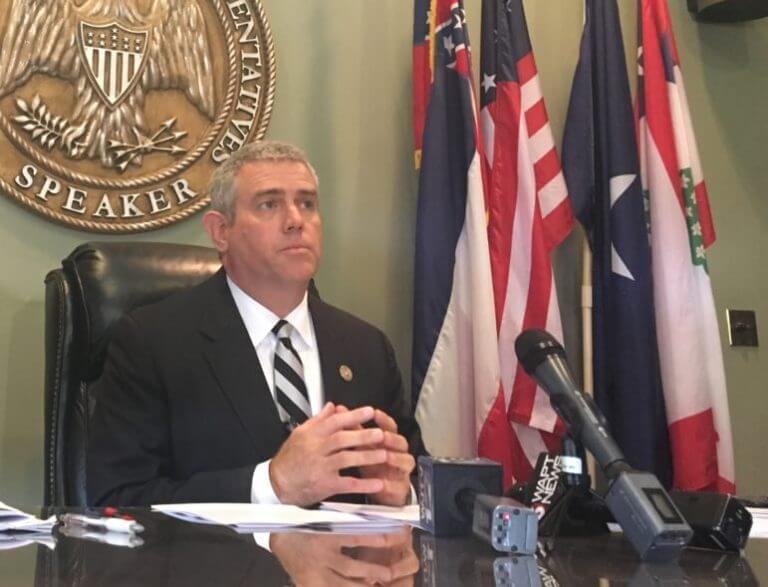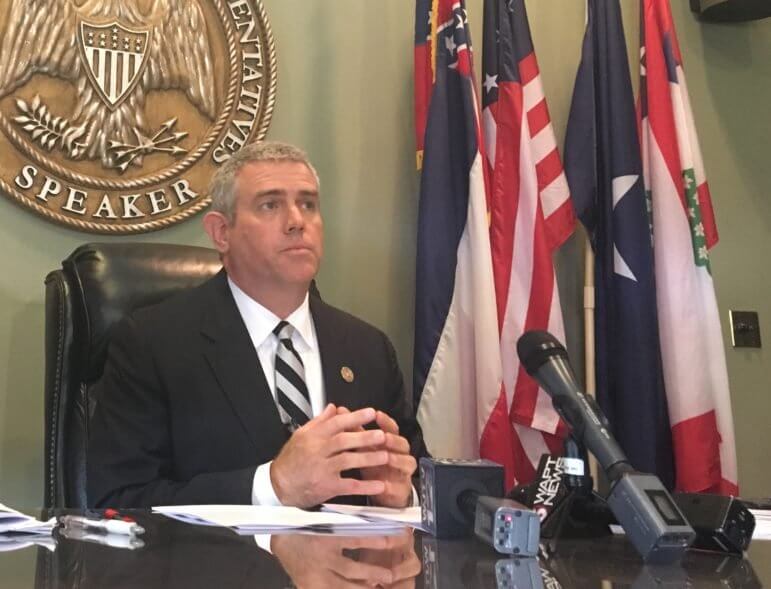

Kayleigh Skinner, Mississippi Today
House Speaker Philip Gunn, R-Clinton, speaks to reporters after the 2018 legislative session ended.
House Speaker Philip Gunn said his pending lawsuit against Gov. Tate Reeves over the governor’s partial veto of a bill spending federal COVID-19 relief funds is “an unfortunate situation,” but important to pursue on precedent.
“It sets a precedent, if we allow this type of veto to stand, when there is case law as I understand it going back maybe 100 years that says this is not a proper veto,” Gunn said Monday. “I went to the governor after the vetoes, and said if I knew of another avenue to take, I would take it … What we have here is an infringement of the executive branch into the duties of the legislative branch. We are just looking for the court to uphold the law.”
Gunn addressed the Stennis Institute of Government and Capitol Press Corps in an online forum on Monday. The Republican speaker covered numerous topics, including the lawsuit he and Speaker Pro Tem Jason White filed in early August over Reeves’ line-item vetoes. Reeves vetoed about $8 million in legislative spending for Mississippi hospitals and other health care providers from federal funds the state received for COVID-19. The governor also vetoed much of the annual budget for K-12 education, but lawmakers have since returned and overridden that veto.
The state constitution provides the governor with partial veto authority, but court rulings over many years have held that authority is very narrow and have typically sided with the Legislature. The Legislature is given authority over state spending in the constitution, and Gunn and others said Reeves’ vetoes of specific spending infringes on that authority.
Gunn said both sides have agreed that the facts of the case are not in dispute, and that they agreed to try the case based only on filed briefs, not oral arguments. The case is before Hinds County Chancery Court, but likely to be appealed by either side to the state Supreme Court.
Reeves, who has clashed early and often with lawmakers in his first term as governor, primarily over spending authority for federal COVID-19 money, has called the lawsuit “yet another power grab by some members of the House.”
In the Stennis forum on Monday, Gunn also:
- Said lawmakers will return in session sometime before Oct. 5. He said the main order of business will be evaluating federal COVID-19 relief spending and programs. He said much of the spending faces a late-December deadline and lawmakers will evaluate how much has been spent on various programs and whether money left at that point should be shifted or redirected. He said the return to session will be “very focused, and very narrow.”
- Praised legislative colleagues for the historic vote to remove the state’s embattled Confederate-themed flag. Gunn has been the staunchest, and at times only, state Republican leader to advocate removing the 1894 state flag with its divisive Confederate battle emblem. In June, the Legislature voted to remove the flag, and voters in November will vote whether to ratify a new design. Gunn said he didn’t “twist arms” to get the historic vote in the House, but that his colleagues realized they wanted to be “on the right side of history.”
- Said the state budget is in surprisingly good shape, given the pandemic. A recent report shows that through the first two months of the new fiscal year, state revenue is up $259 million, or about 35%, above collections for the same period last year. Gunn said the state is still in unchartered territory with the pandemic and may face more fiscal challenges, but he chalks the current stability to past frugality by the Legislature. This week, lawmakers will hold budget hearings, starting the process of setting next fiscal year’s budget.
- Said lawmakers are not likely to address medical marijuana or expanding early voting opportunities as a pandemic safeguard before the Nov. 3 elections. Voters will choose between dueling constitutional amendments on medical marijuana — or reject both.
- Said he is aware of no pending legislative push to make changes before the election. Mississippi’s absentee and other voting laws are among the most restrictive in the nation. Most states have expanded early voting to avoid long lines or crowded conditions at polls during the pandemic. Mississippi has not.
The post Speaker Gunn: Lawsuit over Gov. Reeves vetoes ‘unfortunate,’ but necessary appeared first on Mississippi Today.
- Ole Miss QB Trinidad Chambliss gets another year of eligibility, under judge’s ruling - February 12, 2026
- Mississippi House passes bill to force local governments and law enforcementto cooperate with ICE - February 12, 2026
- Mississippi Senate pushes to let rural hospitals offer new services - February 12, 2026